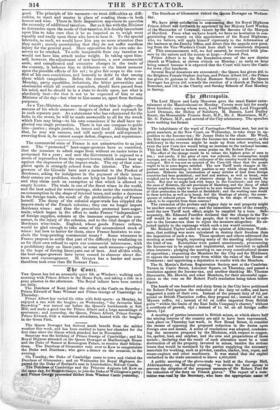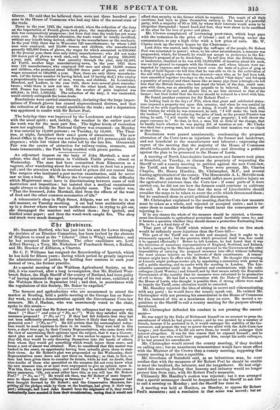'fife Metropolis.
The Lord Mayor and Lady Mayoress gave the usual Easter enter- tainment at the Mansionhouse on Monday. Covers were laid for nearly three hundred; among whom were, Lord Wharncliffe, Lord Fitzgerald, Lord Denman, the Bishop of Salisbury, M. Bunsen, Lord Dudley Stuart, the Honourable Francis Scott, M.P., Mr. J. Masterman, M.P., Mr. G. Palmer, M.P., and several of the City aristocracy. The speeches were nothing but formal.
The inhabitants of the ward of Farringdon-Without met, but not in great numbers, at the New Court, on Wednesday, to take steps in op- position to the Income-tax ; Sir James Duke in the chair. Mr Wood, the first speaker, contended that the Income-tax was unnecessary, as the deficiency in the revenue might be made up from other sources, and even the new Corn-law would bring an increase to the national income. This led Mr. Wood to bestow some praise on Sir Robert Peel— The effect of the change would be to reduce the highest price of corn to 60s.; and surely, if the price of corn was reduced, its consumption would increase, and so the return to the exchequer of the country would be materially enlarged. But it was not on account of the Corn-bill alone that the people ought to be in some degree satisfied. The new Tariff made changes as im- portant and as interesting. in their position as any which cheap bread could produce. Hitherto the introduction of many articles of food from foreign countries had been prohibited; and beef and mutton, as well as bread, were weighed out by the monopolist at whatever charge he chose to demand for them. But now we might look with hopes to the Continent ; and ere long the oxen of Holstein, the salt provisions of Hamburg, and the sheep of other foreign neighbours, might be expected to be seen transported from the places of their production to the market at Smithfield ; and the working man would in these articles, as well as in bread, feel the blessings of plenty, the conse- quence of reduced prices. Was there nothing iu the shape of revenue, he asked, to be expected from these sources ? The extension of the probate and legacy duty to real property might be another source of revenue ; and the immediate wants of the country, until the new Tariff took effect, might be supplied by a loan. Sub- sequently, Mr. Edmund Pontifex declared that the change in the Ta- riff would be so useful to the people, that it would be better to sub- mit to the Income-tax than to reject the measure altogether. He ob- jected mainly to the espionage which such a tax would occasion.
Mr. Richard Taylor called to mind the opinion of Alderman Waith- man, that nothing was more calculated to destroy their freedom than the imposition of such a tax. These speakers and others addressed the meeting at some length, repeating many of the standing objections to the kind of tax. Resolutions were passed unanimously, pronouncing the Income-tax to be unjust and inquisitorial, and intended to uphold class interests ; pledging the meeting to use every constitutional means of opposition ; requesting the Members for the City and for Middlesex to oppose the measure by every form within the rules of the House of Commons ; and appointing a deputation to confer with the Members.
The St. Martin's Reform Registration Society met at the Cambrian Tavern in Castle Street, Leicester Square, on Thursday, and passed a resolution against the Income-tax, and another thanking Mr. Thomas Dancombe, Mr. Blewitt, and other Members, for their successful oppo- sition to the vote on Sir Robert Peel's resolution being taken before Easter.
The heads of one hundred and sixty firms in the City have petitioned Sir Robert Peel against the reduction of the duty on coffee, and have suggested a scale of their own. Instead of the present duty of 6d. per pound on British Plantation coffee, they propose 3d. ; instead of 9d. on Mysore coffee, 3d. ; instead of 9d. on coffee imported from British ports " within the limits of the East India Company's charter," without a certificate of growth, 4id. ; instead of ls. 3d. on all foreign coffee direct, 7id.
A meeting of parties interested in British mines, at which above half the mining interest of the country are said to have been represented, took place on Thursday last week, in New Broad Street, to consider the means of opposing the proposed redaction in the duties upon foreign ores and metals. A series of resolutions was adopted, condemn- ing the measures proposed by the Ministers, with respect to copper, tin, spelter, lead, and sulphur, and the ores and preparations of those metals ; declaring that the result of such alteration must be a total destruction of all the property invested in mines, besides the serious losses that would be sustained by the parties supplying the necessary materials for working, such as powder, candles, timber, iron, ropes, and steam-engines and other machinery. It was stated that the capital embarked in the trade amounted to above 4,000,0004 A public meeting of the glove-trade was held at the George Hall, Aldermanbury, on Monday evening, " to devise the best means to prevent the adoption of the proposed measure of Sir Robert Peel for the reduction of the duty on French gloves." The report of a com- mittee was read by the Secretary, who bore the appropriate name of
Glover. He said that he believed there were not three hundred per- sons in the House of Commons who had any idea of the actual state of the trade.
Down to the year 1825, the report stated, when the reduction of the duty on the importation of French gloves took place, the manufacture of that ar- ticle was comparatively prosperous ; but from that time the trade has got worse every year. By the intended alteration, the trade would be totally sacrificed, without any benefit being derived, either by the manufacturer or the mechanic. In the year 1825, there was in Worcester 125 manufacturers; by whom 1,600 men were employed, and 25,000 women and children, who manufactured annually 625,000 dozen of gloves, the wages for which amounted to 250,0001. In the present year, there were only thirty manufacturers; who did not make 100 dozen pair of gloves a week each, and who, instead of paying 250,0001. a year, paid, allowing for that quantity through the year, only 62,4001. At Yeovil, another large manufacturing-town, in the year 1825 there were 110 manufacturers, who employed 800 men and about 12,000 women and children, who produced about 300,000 dozen pairs of gloves, and whose wages amounted to 120,00W. a year. Now, there are only thirty manufactu- rers, (of the former number 54 having failed, and 13 having died,) who employ a proportionably less number of men, women, and children. In Leominster, Hereford, and Ludlow, in the year 1825, there were several glove manufac- turers ; while there is now not one. On the other hand, the import-trade with France has increased : in 1826, the number of pairs imported was 488,944; in 1841, 1,509,622. The reduction of the duty, it was contended, would entirely extinguish the home-trade.
Resolutions were carried unanimously, declaring that the large impor- tations of-French gloves has caused unprecedented distress, and that the reduction of the duty would annihilate the trade; and a deputation was appointed to confer with Sir Robert Peel.
The holyday-time was improved by the Londoners and their visiters with the usual spirit ; and, luckily, the weather in the earlier part of the week was for the most part fine. The higher kinds of recreation were not neglected. The National Gallery was crammed : on Monday it was entered by 13,000 persons ; on Tuesday, by 10,000. The Thea- tres, at night, furnished their usual quota of amusement. The new Jewel-Office in the Tower was not forgotten, and 275 persons paid their sixpence ; while 348 visited the ruins left by the late fire. Greenwich Fair was the centre of attraction for railway-trains, steamers, and boats innumerable ; the Park being studded with picnic parties.
An adjourned inquest on the body of John Marshall, a man of colour, who died of starvation in Coldbath Fields prison, closed on Wednesday. The man had been committed from Edmonton as a vagrant, after wandering about for some days with no food but a penny roll ; and the attention which he received in prison did not restore him. The surgeon who instituted a post marten' examination, said he never saw so lean a body. Mr. Wakley the Coroner admitted the difficulty which Magistrates must have in discriminating between cases of real destitution and imposition ; but insisted that a medical examination ought always to decide the fact in doubtful cases. The verdict was, "That the deceased, John Marshall, died from the effects of the want of food and the other common necessaries of life."
A tobacconist's shop in High Street, Aldgate, was set fire to in an odd manner, on Tuesday morning. A cat bad been accidentally shut up in a drawer where there were lucifer-matches : in trying to get out, she disengaged the matches and rubbed them ; they ignited, and kindled some paper; and then the wood-work caught fire. The shop and stock were much damaged.



























 Previous page
Previous page